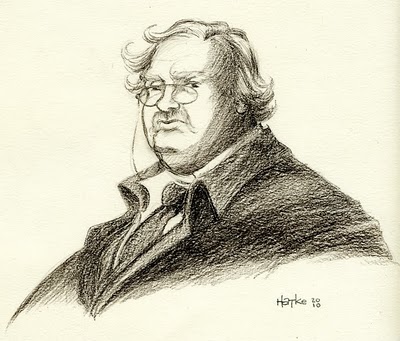The other matter is much more important. Though the reverse of vivacious, Kitchener was very vital; and he had one unique mark of vitality—that he had not stopped growing. “An oak should not be transplanted at sixty,” said the great orator Grattan when he was transferred from the Parliament of Dublin to the Parliament of Westminster. Kitchener was sixty-four when he turned his face westward to the problem of his own country. There clung to him already all the traditional attributes of the oak—its toughness, its angularity, its closeness of grain and ruggedness of outline—when he was uprooted from the Arabian sands and replanted in the remote western island. Yet the oak not only grew green again and put forth new leaves; it was almost as if, as in a legend, it could put forth a new kind of leaves. Kitchener, with all his taciturnity, really began to put forth a new order of ideas. If a change of opinions is unusual in an elderly man, it is almost unknown in an elderly military man. If the hardening of time was felt even by the poetic and emotional Grattan, it would not have been strange if the hardening had been quite hopeless in the rigid and reticent Kitchener. Yet it was not hopeless; and the fact became the spring of much of the national hope. The grizzled martinet from India and Egypt showed a certain power which is in nearly all great men, but of which St. Paul has become the traditional type—the power of being a great convert as well as a great crusader. It is the real power of re-forming an opinion, which is the very opposite of that mere formlessness which we call fickleness. Nor is the comparison to such an example as St. Paul altogether historically disproportionate; for the point upon which this very typical Englishman changed his mind was a point which is now the pivot of the whole future and perhaps of the very existence of Christendom. For many such Englishmen it might almost be called the discovery of Christendom. It can be called with greater precision, and indeed with almost complete precision, the discovery of Russia.
I guess I consider myself "an elderly military man." I joined the Air Force when I was 17, right out of high school. I served for 20 years. I've been "retired" for 28 years. That is, I retired from the Air Force in 1982. While I've held quite a few jobs since 1962, I think of myself as "retired Air Force", not retired from Battelle, Northrup Grumman, Lockheed Martin, or NewPage, my last place of full time employment. No doubt that is because whatever I am today was pretty much formed by my 20 years immersion in the culture of the Air Force.
What's the point? Well, I guess there are several. First, I think the quote (in red above) is quite true, certainly it is for me. Next, every time I've seen this quotation it is referenced back to Utopia of Usurers. I recently read Utopia of Usurers; it's not in there. As the picture at the top of this post implies, the quotation is from Chesterton's book Lord Kitchener. My best guess on how this happened is that whoever made the first reference might have been using Volume V of the Collected Works. The standard reference says pg. 396, of Volume V, CW. And the quotation does, in fact, appear on page 396, but it's in Lord Kitchener. Utopia of Usurers starts on page 399. Who cares? Probably no one, unless you're reading Utopia of Usurers waiting to read the quote!
Finally, Chesterton says a change of opinion is almost unknown in an elderly military man. I don't think I've changed my opinions about much in the last 28 years, but I have about laissez-faire Capitalism. And that change of opinions was caused by the writings of Chesterton, Belloc and all the other Distributists I've been introduced to by the members of the American Chesterton Society.





No comments:
Post a Comment